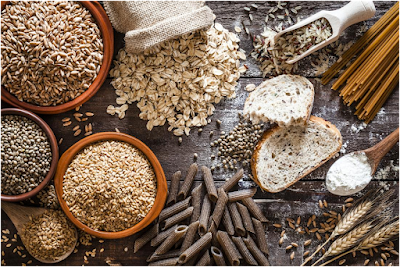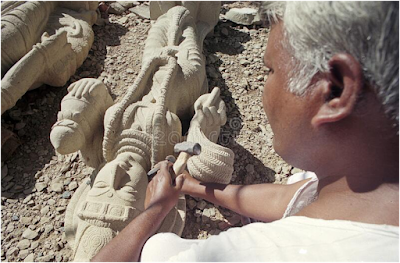THE MIRROR
A humorous Korean Folktale
Long ago, a young farmer married the daughter of a wealthy
family.
One day, he was called away to a far city to conduct
important business.
“What
may I bring you?” he asked his wife.
“A comb,” she
replied at once, thinking how lovely it would look in her long black hair.
As
soon as she had said this, however, the young woman became sad.
She
knew that her husband was most forgetful.
How
could he possibly remember to buy her a comb?
Then
she looked up and saw that the new Moon had risen high in the night sky.
Its
silvery crescent was exactly the shape of the comb she wanted.
“Look there,
Husband,” she said. “If you forget what I asked for, you must look up at the
Moon. The curve of its crescent will remind you of my comb.”
The
young man promised to remember.
Once in the
great city, the farmer found that his business dealings were more complicated
than he had imagined.
Many
days passed before at last he could think about returning home.
Just
as his wife had feared, he had forgotten about her gift.
Then he looked
up and saw that the full Moon had risen high in the night sky.
Its
shining sphere recalled his wife’s request.
“I
am to bring her something shaped like the Moon,” the young man thought. “What
is it?”
The poor fellow
racked his brain, but it was hopeless.
He
simply could not remember.
Finally,
in desperation, he decided to go to a nearby shop. Thinking that perhaps the
shopkeeper could help, he explained, “I am to buy a gift for my wife that looks
like the Moon.”
Although the
shopkeeper thought this odd, he began to search his shop.
At
last he held up a hand mirror and exclaimed triumphantly, “Here! This must be
what she wants. It’s round and silver, just like the Moon.”
The
young farmer had never seen a mirror before, because they were most rare.
But
since his wife was from a rich family, she would undoubtedly know what it was,
and so he made his purchase.
No sooner had
the farmer arrived home than his wife asked for her gift.
Imagine
her surprise when instead of a comb, he handed her this unusual object.
Looking
into the mirror’s smooth, shiny glass, she was further astonished to see the
face of a lovely young woman.
“What
is this, Husband?” she cried. “I ask for a comb, and instead you bring home a
pretty girl!”
In a fit of anger, the young woman ran to her mother.
“See here,
Mother!” she said. “My husband hasn’t brought me a comb at all, only a strange
young girl.”
Her mother
snatched the mirror and gazed into it.
“Why,
Daughter, that’s not a girl. It’s a wrinkled old woman.” She, of course, was
looking at her own reflection.
At that, the
wife began to insist that she saw a pretty young girl.
The
mother was equally firm in her belief that she saw an old woman.
The
two began quarrelling loudly.
Hearing the
commotion, the farmer’s young son hurried over, a bowl of rice in his hand.
The
child picked up the mirror and looked curiously at the glass.
What
should he see but a strange boy holding his bowl of rice.
Letting
out a wail, the child demanded that the stranger return the rice at once.
“Give
it back!” he shouted.
A neighbor, likewise hearing the noise, rushed over.
“Show me the bully who has stolen your rice,” the old man
said, “and I will take care of him.”
He peered into the mirror, only to see an angry grandfather
staring back.
“Why, you terrible old man! Taking food from a child!”
And the neighbour pushed back his sleeve, preparing to
deliver a mighty blow.
He had no sooner raised his fist than the mirror slipped from
his hand and fell to the floor, shattering into a hundred bits of glass.



































